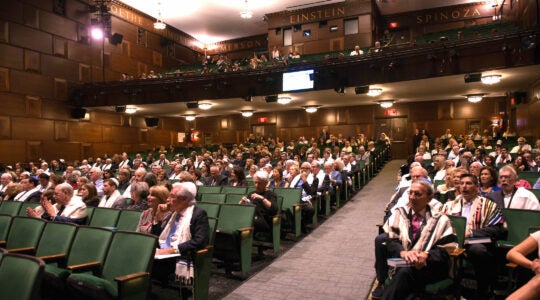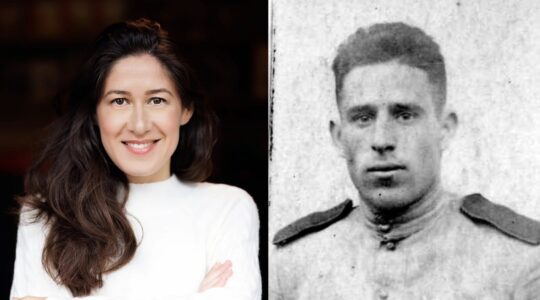This article was originally posted on Jan. 17. It was temporarily removed because of concerns over graphic descriptions. Please be aware that the following includes details of alleged child sexual abuse.
Rabbi Steven (Shmuel) Krawatsky declined to speak directly with The Jewish Week regarding claims of sexual abuse made against him by three campers at Camp Shoresh. However, his lawyer stated that Rabbi Krawatsky “vehemently denies any allegation that he sexually abused a child” or engaged in “grooming” behaviors. Rabbi Krawatsky maintains his innocence regarding these claims.
It should be noted that Rabbi Krawatsky underwent a polygraph examination on Sept. 11, 2015, during the police investigation into the first victim’s claims. The results of the exam, according to the police report: deception was not detected. (Experts question the reliability polygraph exams and they are not admissible as evidence in court.) The Frederick County State’s Attorney Office declined to prosecute a case against the rabbi.
*All three boys are not identified by their real names.
Zev’s Story
When Zev woke up in the middle of the night screaming, Joel and Rachel Avrunin knew something was wrong.
It was the summer of 2015. Zev was 7. He was a sensitive, intellectual child — intelligent, playful and animated. He enjoyed swimming, reading and playing Monopoly with his siblings. He had an encyclopedic knowledge of frogs. The police reports would later describe him as “developmentally above normal,” “friendly and cooperative” and “in good health.”
He was number three in a family of four children. His father, a Cornell-educated electrical engineer, worked a comfortable job in sales management. His mother worked in the home, paying special care to her children’s academic instruction. They lived in a four-bedroom, stone house on a tree-lined street in the Orthodox enclave of Baltimore. It had been their home for nine years.
At the end of June, 2015, Zev started to attend Camp Shoresh, an Orthodox day camp tucked into the green hills of Frederick County in western Maryland. The camp promotes itself as a ‘kiruv,’ or Orthodox outreach camp.
On June 29, Zev came home with a story of another boy bullying him. Concerned, the parents called the camp. They received a phone call back from Rabbi Steven (Shmuel) Krawatsky, an Orthodox rabbi who led the younger boys division at Camp Shoresh at the time.
According to Joel and Rachel Avrunin, Rabbi Krawatsky expressed a special interest in their son. Rachel recalled receiving a phone call from Rabbi Krawatsky during the second week of camp. In the phone call he praised Zev and offered to give him private, one-on-one “social skills lessons.” Surprised by the odd request, she declined the offer. According to the Avrunins, this was the first and only direct contact they had with Rabbi Krawatsky.
During the first week of July, Zev started acting out in frustration, one day pouring nail polish all over the car. He starting staying up at night, complaining of headaches and stomach aches, and told his parents that his eyes were hurting and he was having trouble reading (they brought him to a ophthalmologist, who found nothing amiss). He also began vomiting and asking strange questions about his penis. “What would you do for $100?” his father recalled him asking. He came home on July 13 with bruises on his stomach, which he told his parents were from sports.
Towards the end of camp, Zev started to talk. On July 18, the day after camp ended, his parents say, he came home and told them Rabbi Krawatsky had “shook him so hard his teeth rattled.”
On August 10, Zev woke up in the middle of the night and ran into his parents room. He was crying and distraught. Lying in the bed with his parents, his disclosure began.
On Aug. 10, Zev woke up in the middle of the night and ran into his parents’ room. He was crying and distraught. Lying in the bed with his parents, they say he began to tell them about what had happened.
According to Zev — and documented in the forensic interview conducted with him by Child Protective Services on Aug. 19, 2015, days after the incident was reported to the police and in the first subsequent police report — Rabbi Krawatsky propositioned him, asking him and a friend [the third alleged victim] to touch his penis in a swimming pool locker room in exchange for $100. Zev said that he had gone back to the locker room to get his goggles — and, as he recalled during the forensic interview he “still had his socks on” — when he says Rabbi Krawatsky entered the locker room from a different door, naked. Zev said Rabbi Krawatsky tickled him and asked him to touch his “private parts.” According to the interview account, clarified to the CPS caseworker that Rabbi Krawatsky meant his penis. When Zev refused to do so, he says Rabbi Krawatsky punched him in the stomach. (The CPS report describes the blow as an “overhand hit.”)
The Avrunins say their son told them that Rabbi Krawatsky further threatened him, calling him a “f***er” and threatening to kill him and his parents if he ever spoke about what had taken place.
On Sept. 14, 2015, CPS closed the investigation. Rabbi Krawatsky was “indicated” for child sexual abuse, meaning there was a preponderance of evidence that sexual abuse took place. After Rabbi Krawatsky appealed that determination, the description was changed to “unsubstantiated,” meaning there is not a preponderance of evidence of sexual abuse.
According to Zev’s parents, Zev later disclosed to his therapist, a dialectical behavioral therapist and child trauma specialist, that Rabbi Krawatsky anally raped him. (The therapist, a mandated reporter, reported the rape to the Frederick County Child Advocacy center on Nov. 9, 2017. The police investigation was not reopened.)
Adam’s Story
Adam’s mother tells a similar story. (She requested to remain anonymous to protect her son’s privacy.)
It was the summer of 2015. Adam was 8 years old. Before that summer, he was a lively, energetic and curious child. He had a close relationship with his brother.
During that summer, Adam uncharacteristically began wetting the bed. He complained of horrible stomach aches and developed a tick. He smeared feces on the walls. He started to believe that “monsters lived in bathrooms.” He would run into the bathroom screaming, to “warn other children,” he said.
He started to believe that “monsters lived in bathrooms.” He would run into the bathroom screaming, to “warn other children.”
His mother described receiving phone calls from Rabbi Krawatsky during the course of the summer, praising Adam and promising to work with him one-on-one to help him control his “anger.” In one such phone call, Rabbi Krawatsky told her that he had taken Adam into the pool locker room alone to reprimand him for bad behavior, in order not to “embarrass” him in front of the other children.
At home, Adam was dodging questions about Rabbi Krawatsky. “He’s my son,” she said. “I know when he’s lying — he was lying. In the beginning, he would say ‘no, no — Rabbi K. didn’t do anything. He’s so nice. He wouldn’t hurt me.’”
Nine months later, Adam’s mother says her son began to share more details. She says he disclosed he had been anally and orally raped by Rabbi Krawatsky.
“He crawled into bed with me and it all just came tumbling out,” his mother recalled.
According to Adam’s mother, her son said that Rabbi Krawatsky had threatened to “cut off” Adam’s penis, ears and “chop up his parents, brother and cousins” if he ever told his family about what had happened.
“He truly believed Rabbi K. could see and hear him,” she said. To this day, whenever they drive to Baltimore, her son is a “mess.”
After reporting Adam’s disclosure to the Frederick County Police Department in February 2017, Adam was taken to the Child Advocacy Center for a second forensic interview. (In a first forensic interview in 2015, he had not disclosed details of the alleged abuse.)
On March 1, 2017, Child Protective Services “indicated” Rabbi Krawatsky for child sexual abuse that occurred during the summer of 2015. After a legal challenge by Rabbi Krawatsky, the finding was changed to “unsubstantiated,” meaning there is not a preponderance of evidence of sexual abuse.
Boaz’s Story
Boaz, Rabbi Krawatsky’s third alleged victim, was interviewed by a CPS caseworker and the Frederick County Police on Dec. 22, 2015.
According to the police report documenting the interview, Boaz said that Rabbi Krawatsky did something “mean,” but claimed he could not remember any further details.
(According to child trauma experts, most child victims do not disclose sexual abuse immediately; it is, in fact, extremely rare).
The CPS caseworker found sexual abuse in this instance to be “unsubstantiated,” meaning there was not a preponderance of evidence that abuse took place.
Boaz’s father, who requested to remain anonymous, told The Jewish Week that his son later disclosed to a specialized trauma therapist in early 2016 that Rabbi Krawatsky had asked him to touch his penis in the pool locker room two times over the course of the summer. Boaz said Rabbi Krawatsky was naked, and was verbally abusive towards him, threatening to “punish” him if he did not comply with his proposition.
Boaz’s therapist, a mandated reporter, reported the case to Child Protective Services shortly thereafter, according to the father.
He was not surprised by his son’s disclosure. He had noticed a disturbing buildup of troubling behaviors during the summer of 2015. Boaz, once a happy, outgoing child, had started acting out, displaying “explosive” episodes of anger. “Every day was like a barrel — a small spark could cause an explosion,” said the father.
There were other unusual signs, too. Boaz would come home with gifts from Rabbi Krawatsky. On an overnight camping trip, Boaz video-called his parents to wish them good night — when they asked whose phone he was using, he said it was Rabbi Krawatsky’s.
Two weeks before camp ended, Boaz was asked to leave. Shoresh staff told Boaz’s father that his son had been caught trying to run away.
Two weeks before camp ended, Boaz was asked to leave. Shoresh staff told Boaz’s father that his son had been caught trying to run away.
The father, an Israeli physicist who works as the director of engineering in a small company outside Baltimore, lives with his wife and three children in a quiet suburb of Washington, D.C. They live a traditional Jewish life and attend the local Chabad synagogue.
Still, though the family has made strides forward — Boaz attends a school for children who suffer from post-traumatic stress disorder and is doing “beautifully,” the father reports — the incident left a deep wound that has yet to heal.
The father’s voice on the phone sounded weary, resigned. “A crime was committed. Kids were hurt. And nothing was done.”
Please read the full investigative report here and the Jewish Week editorial here.
The New York Jewish Week brings you the stories behind the headlines, keeping you connected to Jewish life in New York. Help sustain the reporting you trust by donating today.




